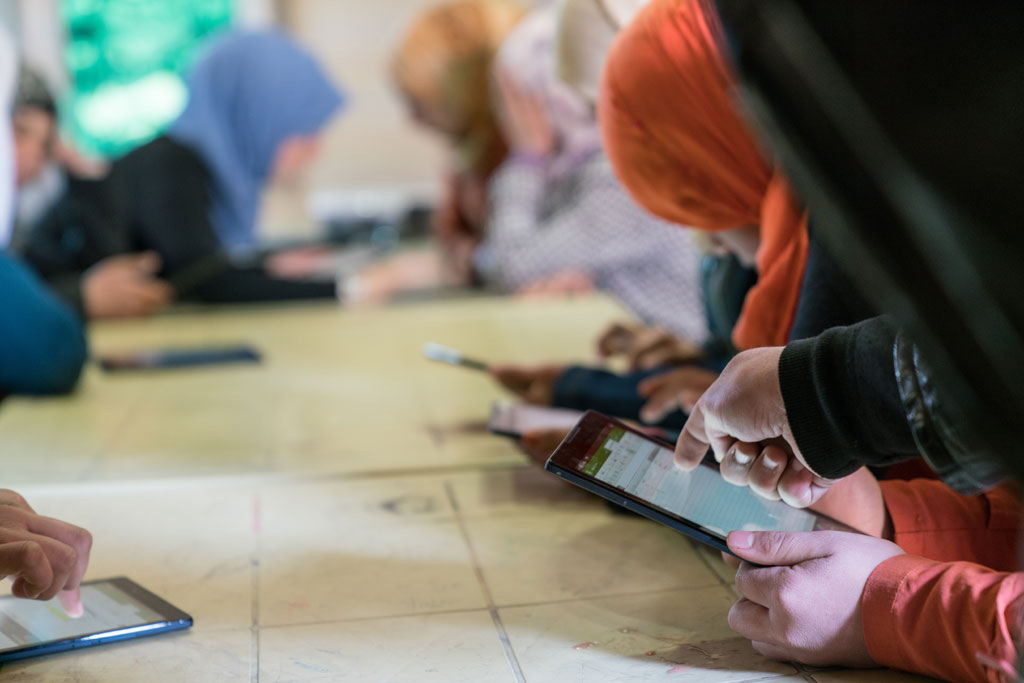GBC-Education Member Companies Participate in Mobile Learning Week 2017

Photo by UNICEF/Christopher Herwig
On Monday, Mobile Learning Week launched in Paris, France. The business community flocked to Paris to participate in various symposiums, workshops, strategy labs, and policy forums; with other members of the international community such as the UNHCR, the business community is discussing ways that mobile technology could provide access to education for refugees, children out-of-school and children who find themselves unable to receive a quality education. The focus of the event is education in emergencies and crises, a topic that is especially salient today as the world faces the worst refugee crisis since the end of World War II.
With refugee populations on the move and conflicts worsening, education is under attack and schools are targets of violence. When conflicts or crises happen, the immediate response is to deliver aid in the form of medicine, shelter, food, water and other vital resources. Yet, education is not prioritized as one of those essential resources. In fact, of the $22.2 billion in overall humanitarian aid in 2014, only 1% went to education.
Education needs to be a priority investment in the humanitarian response to crisis. In fact, education plays a critical role in both humanitarian and development efforts. By providing children access to education in times of crisis, governments and civil society organizations can ensure that these children are able to continue learning and developing their skillsets. Schools provide a space for children to be safe and interact with children their own age. Moreover, by ensuring access to education for children in emergencies, governments and civil society organizations can ensure that long-term development goals remain in place. Without education, an entire country or people may lose out on having a generation of people who can rebuild and revitalize the country post-crisis.
The business community offers a unique way to address education in emergencies. The private sector can play a key role in both delivering funding and in-kind services in a way that neither governments nor civil organizations can. In addition, investing in education is a worthy investment for the business community. A 2013 study shows that for every $1 invested in a child’s education in Indian companies, there is a $53 return to a company at the start of employment.
Mobile Learning Week provides the business community, specifically the tech community, to showcase and discuss the various ways that it is using Information and Communications Technology (ICT) to reach out to children who are in need. The tech community’s ability to utilize their innovative products and services is essential for children, especially refugee children. Therefore, one of the ways to address this crisis in education is to utilize the technology that many of these refugees already have. Many refugees have access to mobile devices, some of the few items that they bring along with them when forced from their homes.
For Mobile Learning Week, the business and international community is convening to discuss ways to make education more accessible to refugee populations when education would be inaccessible otherwise. GBC-Education Member companies are supporting mobile learning initiatives and are participating in conferences throughout the week:
Pearson – UNESCO and Pearson are partnering together to look for new ways to achieve quality education for all. This partnership includes implementing a new project to harness innovative ICT and solutions for improving literacy across the world. The project investigates, documents, and shares the number of innovative cases and develops specific guidelines and scenarios to inform governments, industries and non-profit organizations.
Intel – In 2016, Intel launched an initiative to strengthen the use of technology in the India’s education ecosystem. In India, Intel is collaborating with leading device manufacturers, educational digital content publishers, as well as education solution providers, to build end-to-end solutions that promote the use of technology in India’s education sector. Intel is one of the sponsors of Mobile Learning Week 2017.
Microsoft – In partnership with UNESCO, Microsoft launched the “Mobile Literacy for Out-of-school Children Project’ in 2015 to enhance basic literacy and numeracy skills of the thousands of migrant, ethnic minority and stateless children in Thai-Myanmar border areas through the use of ICT devices. Microsoft is a supporting company at Mobile Learning Week 2017.
HP – In response to the Obama administration’s Call to Action set forth in 2016, HP committed $1 million to open new HP Learning Studios in the Middle East. HP started this project in collaboration with the Global Business Coalition for Education and GBC-Education members Microsoft and Intel to establish centers equipped with computer systems and teacher training stations to give refugees greater access to education opportunities. HP is a supporting company at Mobile Learning Week 2017.
Follow our member companies’ participation in Mobile Learning Week on Twitter at #MLW2017:
Pearson:
Find out more about mobiles for low-literate and low-skilled refugees at #MLW2017 exhibition area UNESCO-Pearson @rewritinglives @Pearson
— Steve Vosloo (@stevevosloo) March 20, 2017
Intel:
@rozhudnell of @intel Foundation Together we have an opportunity that technology could makes possible to #change our world #MLW2017 @UNESCO pic.twitter.com/NcrnIgl9KP
— Jacques Macaire (@Humanbe) March 20, 2017
Microsoft:
Room 2 @UNESCO #MLW2017 Panel discussion on how to support learners with @WarChildHolland @Steven_Duggan of @Microsoft etc.. pic.twitter.com/KzYkVSQqzq
— Jacques Macaire (@Humanbe) March 20, 2017
HP:
Check out the sprout from HP at #MLW2017 using a great language learning tool which brings sentences alive. @TabletAcademyUK pic.twitter.com/dvTe6VyLvg
— Prof Steve Molyneux (@ProfSMolyneux) March 20, 2017
